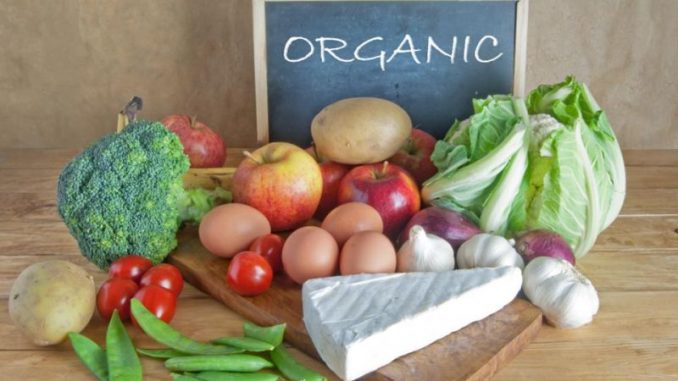
If you have been to the grocery store lately, you will have noticed the diffusion of the organic food movement into the mainstream consumer’s (and retailer’s) consciousness. How often have you glanced at the meager organic food section in your big name grocery store and wondered, if only briefly, “What’s the deal with that organic stuff anyway”? Well, here is the deal for your future shopping consideration.
The organic philosophy and regulation
While each country has their own standards and regulations that they impose (or at least strongly suggest) on food labeled organic, there is an international philosophy out of which the international standards for arise. Organic philosophy arises largely out of a broad respect for and commitment to both social and ecological responsibility.
The first tenet of the philosophy is the ecological one. Organic production standards are based on managing a farming system built on biological cycles (for example, rotating crops to reduce soil erosion and maintain the long term fertility of the soil) and non-chemical treatment. For example, instead of using chemical pesticides, pests are treated with insect predators, natural repellants, and other non-chemical methods. Weeds are controlled by mulching, mowing, hand weeding or mechanical cultivation, and fertilizers are not chemical or sewage based.
The ecological benefits of this type of natural agriculture not only protects the fertility of the soil, it also protects our air and water supply from being contaminated by run-off chemicals that enters the soil and water supply and is blown through the air and into our environment.
In using ecological and biological cycles in nature, there is also a consideration of the balance between crop production and animal management. In raising organic livestock, one must take into consideration the natural behaviors of the animals, such as freedom of movement and suitably natural nutrition. Animals that are raised to be sold as organic animal products should not be given growth hormones or antibiotics.
Finally, organic farming should be committed to social responsibility within the industry, including providing the workers in the organic farming industry with a safe working environment and a quality of life that meets their basic needs.
Regulations and the extent to which they are enforced differ from one country to another. For instance, as of fall 2002, Canada’s organic food standards are voluntary and no punishment exists for food that is mislabeled as “organic,” while a failure to meet the organic food regulations in the United States can result in a fine of up to $10,000.
Be aware as well that organic food should be labeled as such, and pseudonyms such as “natural” or “free-range” do not necessarily mean organic. If a product is made up of largely organic foods, the label should contain a list of ingredients that indicates which are organic and which are not.
The benefits of organic food
As mentioned above, there are many environmental benefits to buying organic food, including soil and water health. Aside from the environmental dangers associated with the use of chemical pesticides, fertilizers and pharmaceuticals, there are health benefits for the individual. Since the aim of pesticides is to kill living organisms, it isn’t a far leap to realize that they are probably not terribly healthy for the human body either. The Environmental Protection Agency (EPA) in the United States considers 60% of all herbicides (kills weeds), 90% of all fungicides (kills mold), and 30% of all insecticides (kills insects) as potentially carcenogenic (cancer-causing). This is not only a concern for those of us consuming these chemicals in our food, but it can be devastating for those who work on these farms, inhaling harmful chemicals and absorbing them into their skin. Buying organic is really the only way in which to ensure you are not supporting these kinds of operations.
Buying organic animal products not only contributes to the humane treatment of animals, it protects the consumer against ingesting chemically and pharmaceutically laden food. Animals who are raised under organic regulations are not given growth hormones or food that is lced with antibiotics. Non-organically raised animals often feed on the remains of other animals, increasing the amount of chemicals they consume, and that we, in turn, consume. The use of antibiotics in animal feed is thought to contribute to a reduction in the benefits of antibiotics through the creation of antibiotic-resistant pathogens.
Nutrition and taste are also important factors to take into consideration when considering buying organic food. Compare the taste of your own garden-grown tomatoes to those offered in your average grocery store. Pesticides, preservatives, and waxes alter the natural taste and texture of your food. This seems especially acute in fruits and vegetables. The priorities for many conventional farming operations lie in the uniformity of shape and colour, the ease of shipping and the cosmetic appearance, with taste coming in a distant fourth. We do shop with our eyes in the store, after all, and cosmetic appearance often gets the food into our shopping carts, as we cannot very well taste the product before purchase.
There have been conflicting studies on the nutritional superiority of the organic food. Some studies have found that organic foods contain “up to” 60% more vitamins, minerals, and enzymes, other studies are inconclusive. It is important to point out, however that although organic food may not be scientifically proven to be more nutritious, it seems logical the organic foods are certainly more healthful. While they may not contain more nutrients, there is certainly something to be said for the chemicals that they lack.
It must be said that the two primary roadblocks to buying organic foods are the availability and the price tag. While specialty organic store and organic food sections in health stores are more prevalent, real diversity in organic product options still hard to find outside of large urban centers. Many mainstream grocery chains have started to offer organic food sections, but these are often quite paltry when compared to the non-organic alternatives. This situation will only change with a demand for the product, however.
The other primary consideration is the price of organic food, which runs an average of about 20-25% above the price of non-organic alternatives. The reason for this lies in better subsidies for non-organic farms in some areas as well as the reduced yield of organic farms, of which up to 25% of the soil may not be used due to crop rotation and other considerations. When you take into account the cost of cleaning up the environment, the cost to the healthcare system and the money you pay in taxes to subsidize intensively farmed foods, however, you are saving both economically and ecologically when you buy organic. It is certainly worth considering.
